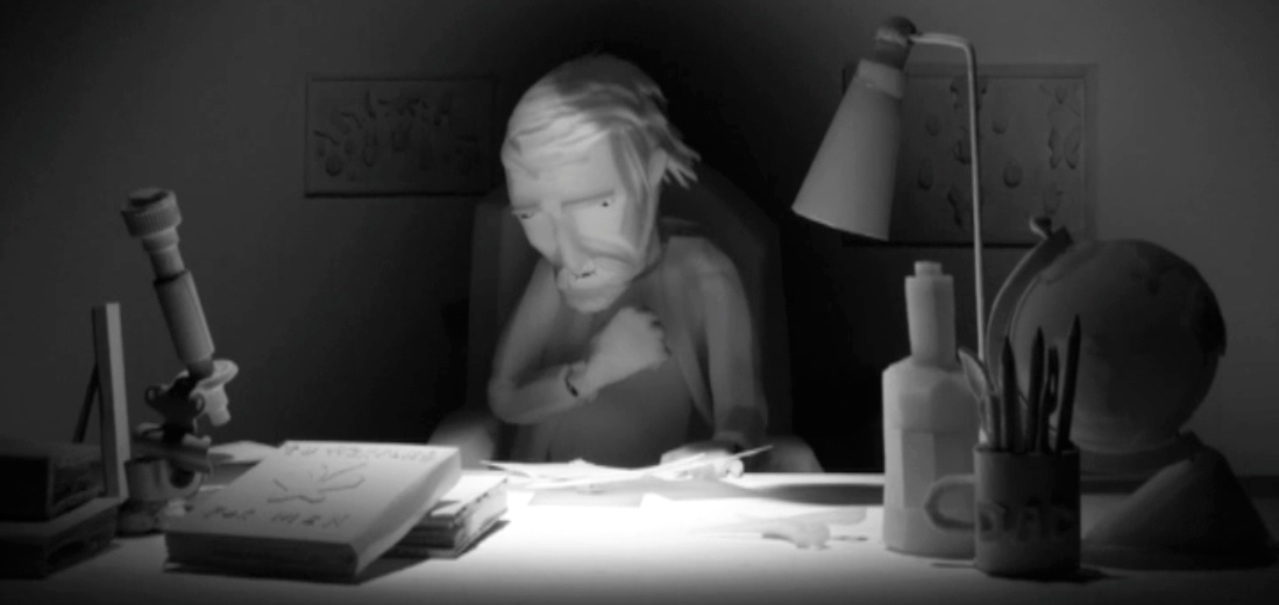We Like Shorts, Shorts is a new column in which we single out impressive short films which are easily accessible online. The full shorts will always be embedded in the articles for easy access.
“I see infinity in a ply-board desert, and feel a brief, terrifying sensation that I’m an inanimate… object.”
Animation is a genre. It shouldn’t be, but the medium’s highest-earners practically demand it so. Nearly two decades after its last game-changer in Toy Story, they’re still giving us the same brand of smart-alec romp; a predictable mix of camera-swirling action beats, broad slapstick routines for kids, surly nestled wisecracks for adults, and celebrity avatars shouting to the back of the room. Anything that can defy that norm reminds us of animation’s limitless capacity, and makes staid efforts that squander it all the more confounding.
Perhaps the problem is a fixation with the “how”, where it’s used as a quick route through staging a simple story, instead of a curiosity with “why”. UK filmmaker Michael Please is all about “why”. He’s not just a stop-motion animator but a film-maker, and he works in a conceptual playground where even Laika might fear to tread. The Eagleman Stag is his best work to date, a fable where a man makes a scientific breakthrough that brings his selfish lust for permanence to the surface, and sends him back through the travails of his fabulously mundane life. As Peter fruitlessly attempts to turn nature to his biological advantage, we are reminded constantly of our own magnificent fallibility.
Please and his team’s signature white-paper style challenges us to see images in a different way than the most common animated films dictate. By bleaching out the distracting quirks and signifiers of the animating process, he is begging for us to forget about the procedure of animation and focus on the philosophical chase at hand. It’s something we must construct with him, not have fed to us, and rendering a blood-pooling gash this way while narrating its red colour is a defiant gesture to that end. That moment and the whole film are underplayed nicely by Please’s classically British self deprecation – mostly by way of the dry voiceover by David Cann – which confounds our trek through the infinities with the same absurdity that makes them so hopelessly incoherent. Overall, the tone is enjoyably bitter, with his hero being miffed at the universe itself for denying him individualist glory, and ending up literally frozen solid by his need to live a thousand hopes and dreams at once. It’s a blithe recount that is perpetually and charmingly aware of itself, right up until its daringly meditative coda.
After the credits roll, with Michael’s brother Benedict forcing us out with his strange string-plucking score, there are more great works to be found on Please’s website. His newest film Marilyn Myller is another hypnotic look inside a frustrated mind, and his essay “The Uneven Crust” is a beguiling reflection on the beauty of imperfection. There’s a grounded version of Peter’s odd voyage of discovery going on here, and I get the impression Please is scarily perceptive of the real journey he must make to be the artist he wants to be. After gliding along the skin of the slowworm and enjoying the other tactile pleasures of The Eagleman Stag, you wish him nothing but the best.
